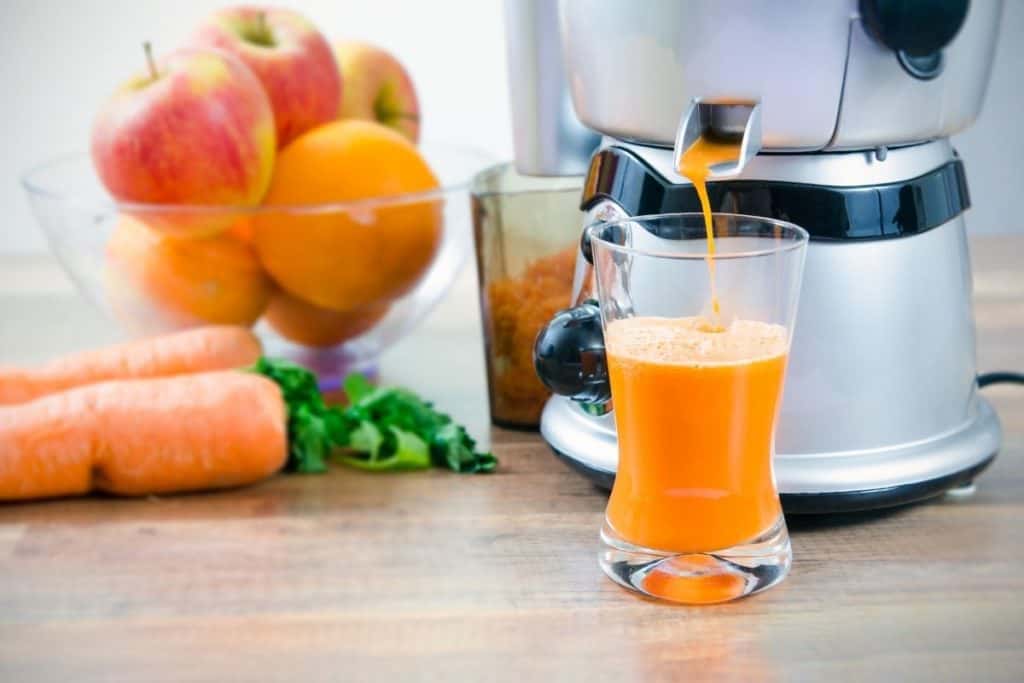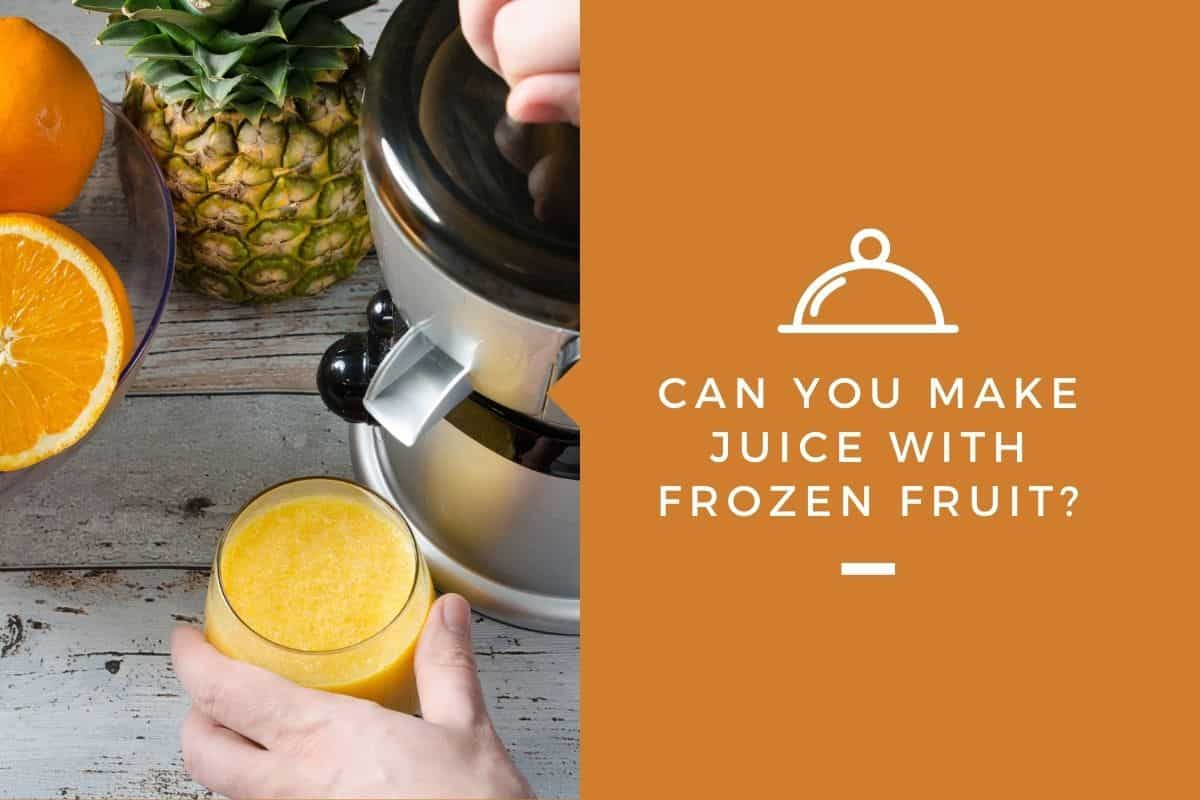Everyone loves a fresh cup of squeezed fruit juice. It is refreshing on a hot day, and for the health-conscious, it is an excellent way to get your vitamins in the morning.
But is it okay for you and your juicer to use frozen fruit to make your juice?
You can use frozen fruit in your juicer as long as you are careful to thaw it appropriately and follow your juicer’s instructions. With a few modifications, using frozen fruit is much like using fresh fruit in a juicer.
Using frozen fruits in your juicer is an excellent way to have access to out-of-season fruit. Think of how nice it would be to have a fresh squeezed pineapple-strawberry juice in January? Using frozen fruit, you can.
Depending on the method of thawing you use, using frozen fruits can be more nutritional than out-of-season fruit for juicing.
When using out-of-season fruit the produce has not been permitted to finish ripening on the plant. This means it never reaches maturity and has a lower vitamin and nutrient content than mature produce.
Frozen produce is harvested ripe and fresh and is then frozen within 48 hours of being harvested. This process preserves most of the nutrients of the produce and much of the flavor.
There are a few intricacies you should be aware of before you start juicing frozen fruit and vegetables. Let’s dive right into it!
Can You Put Frozen Fruit In a Juicer?
The quick and easy answer is, yes you can put frozen fruit in a juicer. But, there are some technicalities you should take into consideration before you start juicing your frozen produce.
It is not likely that frozen fruit will harm your juicer, since most models are designed to grind some pretty hard fruits. If you give the fruit some time to thaw, then they taste very similar to fresh fruits.
There are some differences in the taste and the quality of the juices created when using unthawed, frozen fruit rather than fresh fruits. This is usually caused by the ice creating a slush-like consistency, or watering down your juice as it melts.
This is why thawing is so important and will be explained in detail below.
Why Should You Thaw Your Fruit
The main reason thawing your frozen fruit is such a good idea when juicing is it helps the fruit retain their original flavor and texture.
When unthawed, frozen fruit is pressed through the juicer, the meat of the fruit is very tough and may get shaved into your juice. This means it will feel much more like a smoothie or slush than a juice.
Unthawed frozen fruit also introduces ice into your juice. Unless you drink it rather soon after making it, the ice may melt and water down your drink.
But, there is absolutely no reason not to use frozen fruit. Just let it thaw first. Allowing your frozen fruit some time to thaw can prevent it from ruining the taste and texture of your drink.
How To Juice Frozen Vegetables, Fruit, and Berries
To juice your frozen fruits, vegetables, and berries, you must first thaw your produce, then add them to your juicer, and finish.
The remainder after thawing is generally the same for frozen produce and fresh produce. Based upon the type of juicer you have the process can vary a little; but generally, you feed the produce through a tube where they are crushed by a weight or blades.
The pulp is then separated from the liquid juices from the fruits and dispensed in a receptacle. The thawing process will be discussed in detail below.
Thawing Produce
Thawing is the most important part of the juicing process for your frozen produce. Thawing is basically the process of “melting” your frozen fruit. As the fruit warms up, the ice turns to water.
This can be accomplished by putting your fruit in a bowl and leaving them in the fridge for a couple of hours (you can also just leave them on the counter, but I would cover them with a towel to deter fruit flies).
To quickly thaw you can run the fruit under warm or tepid tap water for a couple of minutes. This is not recommended unless you need the fruit right away, because the rinsing process pulls some of the flavor and nutrients from the produce. It’s a good idea if you are in a fix, however.
Be careful not to over-thaw your produce. This is especially true for certain vegetables and certain berries. Over thawing can turn your produce into a pile of goo.
Thawing hard fruits and vegetables: Hard produce would include produce such as pineapple, melons, papaya, mango, carrots, beets, and rhubarb. These fruits and vegetables have a strong structure.
When they are thawed completely, they return much to the same structure they had when fresh. These fruits and vegetables can be thawed completely without it destroying their structure.
Thawing soft fruits and vegetables: Soft fruits and vegetables include berries such as raspberries, blackberries, and blueberries. Other fruits such as plums and peaches. And, vegetables such as spinach, kale, and collard greens.
These should only be partially thawed to soften them enough for a smooth juicing.
What Fruits Should You Not Put In a Juicer?

Primarily, you should avoid putting drier, or overly fibrous fruits in your juicer. Avocados, plantains, and bananas are key culprits for messing up a good juice.
These fruits are very dry with very low water content. This makes them very difficult to extract juice from. Rather, you will get either mush or a jammed juicer.
Many people make this mistake because bananas, avocados, and other dry fruits make a great addition to a smoothie. But, juices are fundamentally different as they are the extraction of the water from the fiber of the fruit. For these dry fruits, it’s not possible to get the juice extracted.
Avoid overly fibrous fruits that have not been properly broken down and peeled. These include grapefruit, oranges, and lemons.
These can be juiced, but be sure you peel them and do not put the fruit in the juicer whole. Separate the different pieces and add it in smaller quantities to prevent the fibres from clogging the juicer.
Can You Get Sick From Frozen Fruit?
Frozen fruit won’t get you seriously ill unless they are contaminated by another germ or bacteria. Bacteria and diseases can live on frozen fruit if it was touched by a contaminated surface or person.
These bacteria can be passed on to the consumer. However, this is true for unfrozen, fresh produce just as well as for frozen fruit. A good way to avoid this is by purchasing washed frozen fruits.
Other annoying, yet generally unserious illnesses which may result from using frozen fruits in your juices are cramps, diarrhea, and constipation. Rarely, these can be signs of something more serious, such as food poisoning.
However, most of the time these are simply the result of the sugars reacting with your gut. Depending upon what you juice, you can experience different symptoms.
If you juice vegetables you may experience some constipation the first couple of times you drink this juice. Many people report feeling bound up for the first few days of drinking fresh juices, but after a few days this usually stops as your body adjusts.
Likewise, juicing high sugar content fruits (apples, pears, and pineapple) can lead to mild diarrhea. This is usually the result of the sugars interacting with your digestive tract. It can be excellent for cleansing and if you are constipated.
You may wish to try to blend these high sugar fruits with less sugary fruits such as raspberries and blackberries. These sugars will be more balanced and you’re less likely to experience a sudden bowel movement.
Otherwise, juicing frozen fruits is perfectly safe and healthy!

